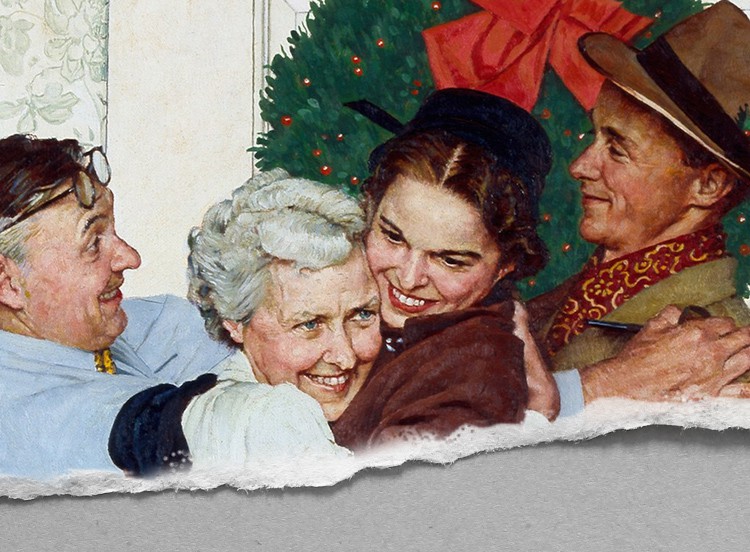
In 1943, Bing Crosby recorded what has now become a favorite song for many people during the holiday season: “I’ll Be Home for Christmas.” The song was originally composed with overseas soldiers in mind as the songwriter imagined the soldiers’ longing for family during the holidays: “I’ll be home for Christmas, if only in my dreams.” For many of us, this sentiment rings true. The holidays bring up feelings of love and family unity, and whether or not we’re able to be with family during the holidays, we can empathize with the same longing those soldiers must have felt.
Yet, I can’t help but recognize that this time of year may highlight memories of family trauma for others. In my work as a licensed marriage and family therapist, I hear so many patients talk about their fears of seeing family during the holidays. As they consider traveling “home for Christmas,” the thought re-entering what Miriam Taylor and others have called the “trauma ground” becomes a hateful thought for so many.
Those of us who carry these fears carry the memories of a childhood marked by neglect, abuse, mistreatment, and misattunement; all of which have left indelible wounds on our psyches. And yet, we’re expected to return home to the family system feeling the joy and love that the holidays are supposed to bring. For a lot of us, this is just not possible. Time with the family sometimes means that we revisit those family roles that had a negative impact on our development.
Sometimes Family Just Doesn’t Get It
In her powerful book, The Drama of the Gifted Child (1979), Dr. Alice Miller discusses all the major and minor misattunements that happen in our families of origin. That’s clinical language. Attunement is that experience you when two people just “get” each other. They’re attuned to one another’s emotions–a close, real-time experience of deep empathy.
Misattunement is the opposite of that, and can be particularly damaging for children because kids typically don’t have the language to say “you’re not understanding what I feel.” Misattunement can leave someone feeling misunderstood at best, rejected at worst. These misattunement wounds we carry from childhood can leave lasting marks on our psyche that we may spend a lifetime trying to correct. It’s been my experience and the experience of so many of my patients that these wounds flare up whenever we are in close and intense contact with our families.
Jesus Had Family Challenges Too
Even Jesus wasn’t immune to the frustration of proximity to his earthly family of origin. Soon after Jesus began his ministry,
he returned to his hometown and read a messianic prophecy from the scroll of Isaiah in the local synagogue, confirming that he had come to fulfill this prophecy (Luke 4:14-30). The response He received was essentially a version of the comments many of us will hear from our extended families in the coming weeks: “I remember when you were this tall! Look how big you are now!” (I’m almost 40, aunt Margaret. I’ve been this tall for 25 years). They just didn’t get what He was trying to say to them. They didn’t get…Him. In a bold move, Jesus spurned the patronizing language of that crowd of hometown locals, and in response, they try to throw him off a cliff! Let’s hope all of our holiday interactions end a little less violently.
The point of all of this is that our early family dynamics can stick with us for many years. No matter how well adjusted some of us become in our everyday lives, coming back into intense contact with our families of origin can thrust some of us into some serious emotional dysregulation. Jesus got a version of a patronizing pinch on the cheek and a tussle of the hair from his hometown family, right after sharing His God-given mission with his home community. Some of us may feel the pressure of undue responsibility that our families always expected of us. Others may feel neglected and marginalized, just like they felt when they were 7. The treatment may be different for each of us, but the feeling is the same.
Letting Go
Here we are, in the midst of another holiday season. With all the joy and excitement that’s inherent in this time of year, this can also be a time of great pain and uncertainty for many of us. We sometimes revert to more primitive mental states that leave us wondering what happened to all that personal growth we experienced over the past year. If you’re like me, you’re emotionally prepping for the inevitable feast of challenging family dynamics. I wonder if we can find comfort in what Dr. Miller proposes – that the way toward emotional health as it relates to our family connection is to begin the process of grief. What would it be like if we grieve the fact that what we wanted and needed in childhood will never come? This process of grief may be the path to true freedom and healing.
People usually try to recreate childhood experiences in adulthood hoping for a better outcome and they end up feeling as hurt as they did when they were a child. It would be better for us to learn to accept that our family members may never be attuned to us. That may seem pretty bleak, but learning to grieve that what has been done cannot be undone–and what was left undone cannot always be done–is the first step to healing. Eventually, we learn to integrate the loss of what we never had into our lives.
All of this doesn’t mean that we give up on experiencing deep empathy and connectedness altogether. We are all worthy of attunement and can find and enjoy it in other relationships where people are clearly want to give it.






















